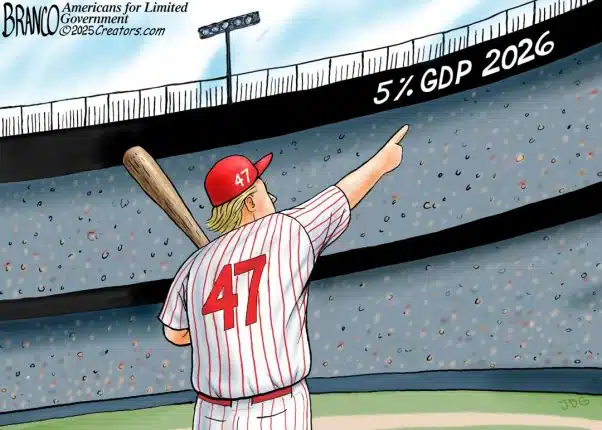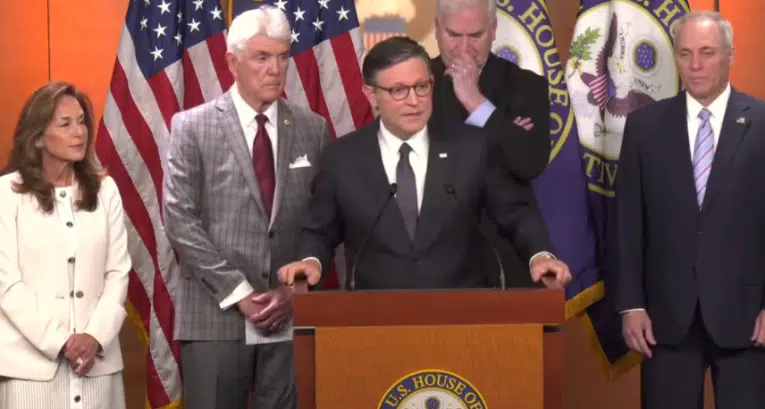NRD Editor’s Note: This column by the chairman of our parent organization was originally published at The Daily Caller.
By Howard Rich — The United States government recently blew past a pair of significant spending mileposts. In a cruel “trick or treat” twist, this Halloween our nation’s debt eclipsed its gross domestic product — something that hasn’t happened since America’s post-World War II demobilization. A few weeks later, in mid-November, the national debt topped $15 trillion — which represents a 105 percent spike over the last seven years.
Yet as the federal government continues blowing your money at an unprecedented, unsustainable rate, politicians from both parties continue refusing to make long-overdue cuts. In fact, after racking up an indefensible $5.8 trillion worth of deficit spending over the past four years, our “leaders” can’t even agree on how to slow the growth of government by a comparatively modest $1.5 trillion over the coming decade.
While such fiscal recklessness has our nation teetering on the brink of insolvency, even more alarming is the rapid expansion of America’s “shadow deficit,” a ticking time bomb of unfunded liabilities that vastly exceeds the national debt.
Consider this: The federal government racked up $5.3 trillion in new unfunded liabilities in 2010, according to an analysis conducted by USA Today. That figure included $1.8 trillion in new Medicaid liabilities and $1.4 trillion in new Social Security promises.
That’s more than three times the increase in deficit spending.
A conservative estimate of our government’s current unfunded obligations puts the total tab at $61.6 trillion — or $528,000 for every American household. However a recent report by Michael D. Tanner of the Cato Institute puts the figure at $119.5 trillion, or more than $1 million per household.
“The vast majority of future debt is driven neither by defense nor discretionary programs but by so-called entitlement programs, three in particular: Social Security, Medicare, and Medicaid,” Tanner explains. “In fact, by 2050, those three programs alone are expected to consume every penny that the federal government raises in taxes. That means that everything else that the government does, from domestic programs to national defense, including paying interest on the federal debt, will have to be paid for through still more debt, or else government will have to raise taxes to astronomical levels.”
Of course it’s not just the federal government that’s making promises its taxpayers can’t afford to keep. State and local governments are also racking up a growing unfunded obligation — one that’s much larger than the public recognizes.
According to an October 2010 report by researchers Robert Novy-Marx and Joshua Rauh, state and local governments have been dramatically understating the true cost of their looming obligations.
“Unfunded liabilities of municipal (city and county) pension plans add $574 billion to the $3 trillion in unfunded state-sponsored plans,” Novy-Marx and Rauh found.
That’s nearly three times the government estimate of $1.2 trillion in state and municipal pension fund liability. A separate 2010 report by researchers Courtney Collins and Andrew J. Rettenmaier of the National Center for Policy Analysis revealed the dimension of the crisis.
“All but 10 states and the District of Columbia have total adjusted unfunded liabilities above 15 percent of their state GDP, and four states — Alaska, Hawaii, New Jersey and Ohio — have adjusted unfunded liabilities above 35 percent of their state GDP,” Collins and Rettenmaier discovered.
While it’s absolutely vital for limited-government advocates to expose the obscene amounts of money that politicians are spending at all levels of government, these statistics demonstrate how important it is to be equally vigilant when it comes to exposing the cost of future political promises.
Just as there’s “nothing quite as permanent as a temporary government program,” there’s also nothing quite as hard to undo as a promised entitlement — something generations of American taxpayers are about to learn the hard way.
Howard Rich is the chairman of Americans for Limited Government.






